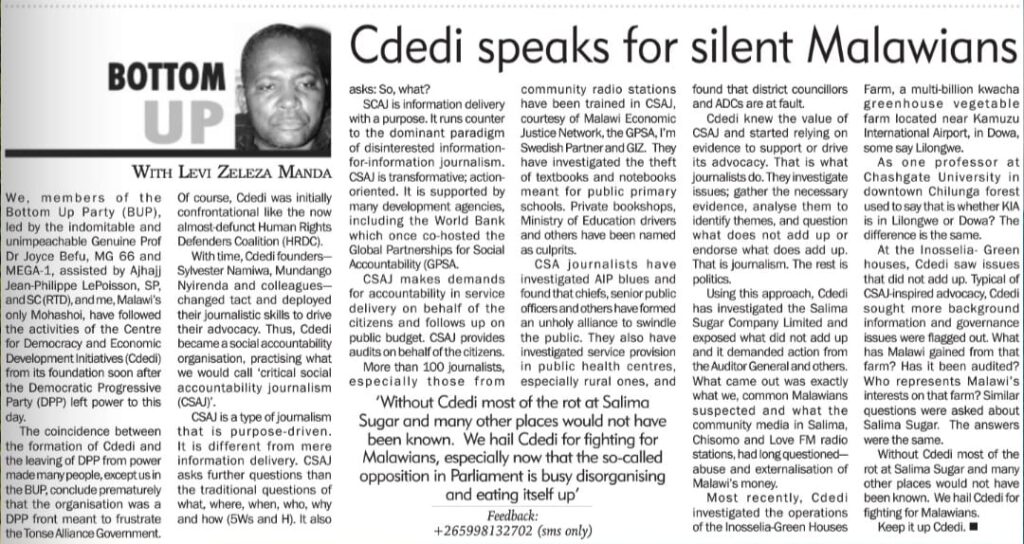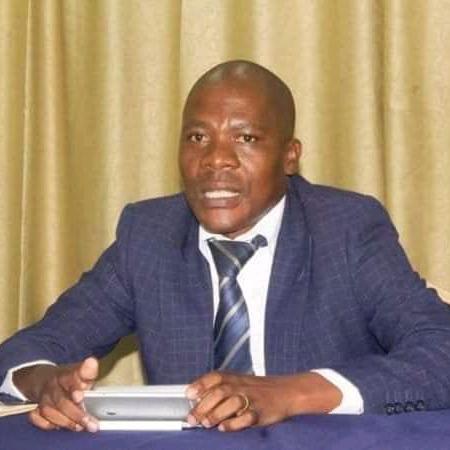By IOMMIE CHIWALO

Top notch Columnist and Veteran Journalist Levi Zeleza Manda has hailed the approach employed by Centre for Democracy and Economic Development Initiatives (CDEDI) for its effectiveness.
Writing in his column ‘Bottom Up’, Manda highlighted that without CDEDI most of the rot at Salima Sugar Company and many other places, would not have been known.
“We hail CDEDI for fighting for Malawians. Keep it up CDEDI,” he writes citing a recent investigation by CDEDI that uncovered what did not add up at Salima Sugar Company and it demanded action from Auditor General and others.
“What came out was exactly what we Common Malawians suspected and questioned – abuse and externalisation of Malawi’s money,” writes the Veteran Journalist who is known for his exceptional research and analytical skills as it is within the same write-up where he acknowledged that of course CDEDI was initially confrontational like the now almost defunct Human Rights Defenders Coalition (HRDC).
He says the current approach by CDEDI has qualified it as a reliable Social Accountability organisation as it is seriously relying on evidence to support or drive its advocacy.
“That is what Journalists do, they investigate issues, gather the necessary evidence, analyse them to identify themes and question what does not add up or endorse what add up. That is Journalism and the rest is politics,” he writes.
In its recent demands from the Attorney General, CDEDI received an applause as well for bringing substantial matters that even the Attorney General Thabo Chakaka Nyirenda was not aware of and agreed to start following up the matter so that the truth must be known and ensure that the culprits are brought to book.
Initially what brought doubts about the existence of CDEDI was coincidence of its formation and leaving of Democratic Progressive Party (DPP) from power, people concluded prematurely that the organisation is a political wing meant to frustrate the Tonse Alliance led government.
Meanwhile CDEDI is requesting for clarity on most of taxpayers money invested in joint ventures meant to benefit Malawians after revelations that such arrangements are only benefiting very few civil servants and politicians, a situation which the organisation feels is what is putting millions of the majority poor facing dehumanizing poverty.
In such a scenario, CDEDI Executive Director, Sylvester Namiwa, said it was important for responsible authorities to update Malawians on suspicious deals surrounding the operations of Greenbelt Authority (GBA) as well as Malawian Airlines.
Namiwa has, thus far, challenged the Malawi Government, through the Minister of Finance and Economic Affairs Simplex Chithyola-Banda to set up a special purpose vehicle with clear terms of reference (ToRs) and targets to recover public money which has been fraudulently stashed in some individuals pockets and business ventures.
He says the call is as a result of ongoing findings that have shown that most of the joint ventures entered into through Public-Private Partnerships (PPPs) neither declare dividends nor make public their annual reports, let alone contribute equity funds as expected.
Namiwa has revealed that demonstrating the worst-case scenario is the fact that some people entrusted to run these ventures are turning public funds, sourced through loans guaranteed by government, into personal shares.
“This is daylight robbery which must be checked forthwith,” he said.
The CDEDI Executive Director has also requested for an action from government on its 49 percent stakes in Malawi Airlines, while Ethiopian Airlines has 51 percent shares.
He says it is worrisome that like what is happening at Greenbelt Greenhouse Limited, the joint venture between Ethiopian Airlines and Malawian Airlines does not make declare its financial reports.
“Failure to declare dividends begs the question as to how Malawians are benefiting from this arrangement,” queries Namiwa who has also revealed that Ethiopian Airlines did not register the airline code for Malawi, instead they opted to use ET as the flight code for Malawian Airlines.
According to Namiwa, this systematic ‘anomaly’ allows Ethiopian Airlines to receive all air ticket money from travel agents across the globe, who sell tickets on behalf of Malawian Airlines.
“Consequently, Malawi Airlines does not know profits, or losses, that Ethiopian Airlines makes. Further, it should be noted that once that money is obtained by Ethiopian Airlines, it is subjected to a 10% collection fee, something that would not happen if Malawi Airlines had its own flight Code, say MWW. All the money would come to Malawi Airlines account,” he highlighted.



